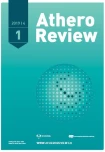Nutraceuticals with hypolipidemic effect in clinical practice: a summary statement of the International expert panel of lipidologists prepared by the committee of the Czech society for atherosclerosis
Authors:
Michal Vrablík 1; Jan Piťha 2,3; Vladimír Bláha 4; Renata Cífková 5; Tomáš Freiberger 6; David Karásek 7; Pavel Kraml 8; Hana Rosolová 9; Vladimír Soška 10; Tomáš Štulc 1; Zuzana Urbanová 11
Authors‘ workplace:
III. interní klinika 1. LF UK a VFN v Praze
1; Interní klinika 2. LF UK a FN Motol, Praha
2; Centrum experimentální medicíny IKEM, Praha
3; III. interní gerontometabolická klinika LF UK a FN Hradec Králové
4; Centrum kardiovaskulární prevence 1. LF UK a Thomayerova nemocnice, Praha
5; Centrum kardiovaskulární a transplantační chirurgie, Brno
6; III. interní klinika – nefrologická, revmatologická a endokrinologická LF UP a FN Olomouc
7; II. interní klinika 3. LF UK a FN Královské Vinohrady, Praha
8; II. interní klinika LF UK a FN Plzeň
9; Oddělení klinické biochemie ICRC a II. interní klinika LF MU FN u sv. Anny v Brně
10; Klinika dětského a dorostového lékařství 1. LF UK a VFN v Praze
11
Published in:
AtheroRev 2019; 4(1): 7-18
Category:
Guidelines
Overview
In recent years there has been an increasing interest in the use of nutraceuticals to improve the treatment of dyslipidemia. According to the results of relevant studies, nutraceuticals can contribute to achieving the target lipid levels and thereby to further reducing of cardiovascular risk. Some nutraceuticals have significant hypolipidemic effects confirmed in studies, some of which can also positively influence other cardiovascular risk factors such as endothelial function and vascular wall compliance. The clinical experience with nutraceuticals administered alone or in combination has been far from unequivocal, and our data for many nutraceuticals are very limited and questionable. The aim of this statement is to provide an overview of nutraceuticals with regard to influencing dyslipidemia in patients not yet taking statins, patients taking statins or combination therapy who have not reached the target lipid levels, and in those with statin intolerance. This statement is intended for doctors and other healthcare professionals involved in the diagnosis and treatment of patients with lipid metabolism disorders, especially in primary prevention. The text is based on the consensus of the International Lipid Expert Panel (ILEP), and was published in 2017 in the journal Nutritional Research [1]. We refer to this publication in the detail section and, for the sake of clarity, we retain selected references to the literature in the original numbering of the original article (citations are available in the electronic version of the journal at www.atheroreview.eu).
Keywords:
combination therapy – dyslipidemia – hypolipidemic drugs – nutraceuticals
Sources
- Cicero AFG, Colletti A, Bajraktari G et al. Lipid-lowering nutraceuticals in clinical practice: position paper from an International Lipid Expert Panel. Nutr Rev. 2017 Sep 1;75(9):731–767.
- ASCEND Study Collaborative Group, Bowman L, Mafham M, Wallendszus K et al. Effects of n-3 Fatty Acid Supplements in Diabetes Mellitus. N Engl J Med. 2018;379(16):1540–1550)
- Citované literární položky 1–299 jsou dostupné on-line v elektronické verzi časopisu. Dostupné z WWW: <http://www.atheroreview.sk>.
Labels
Angiology Diabetology Internal medicine Cardiology General practitioner for adultsArticle was published in
Athero Review

2019 Issue 1
Most read in this issue
- Nutraceuticals with hypolipidemic effect in clinical practice: a summary statement of the International expert panel of lipidologists prepared by the committee of the Czech society for atherosclerosis
- Lysosomal acid lipase deficiency in differential diagnosis of familial hypercholesterolemia
- Therapy of dyslipidaemia in patient with muscular dystrophy: case report
- Psoriasis as a risk factor for cardiovascular events: case report
